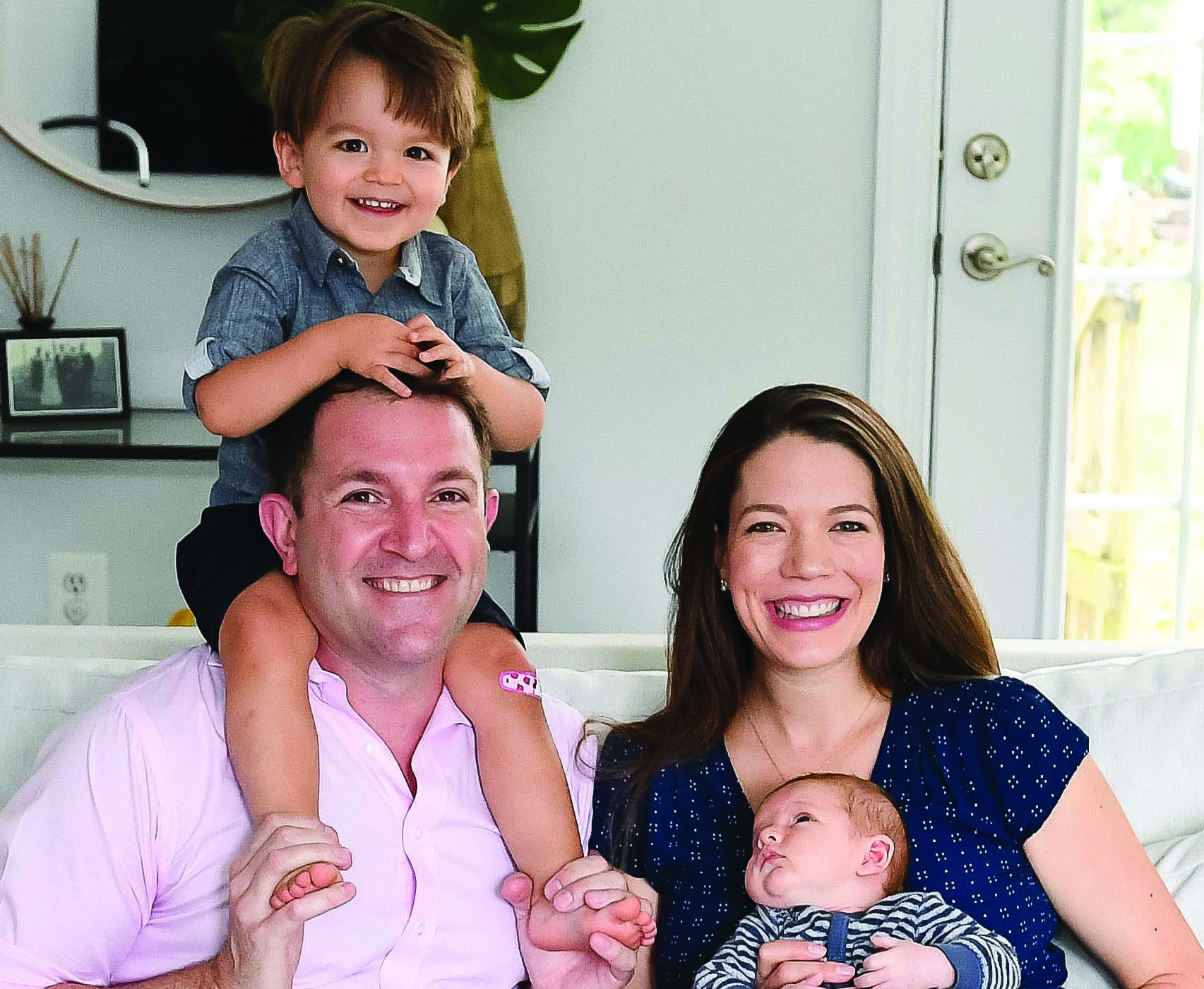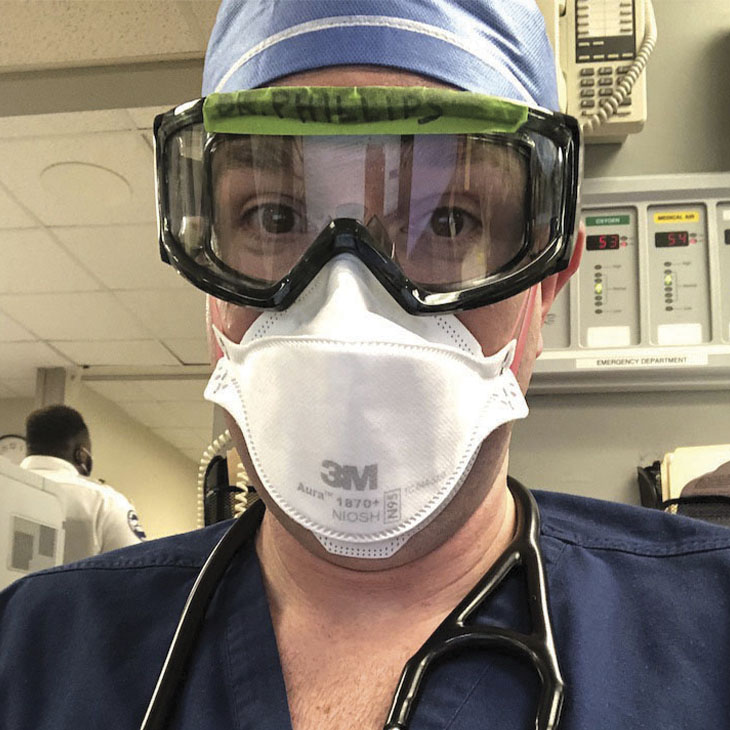
Oklahoma State alumnus is on the front lines in the battle against COVID-19
Thursday, September 3, 2020
As many people across the country and the world sheltered in place to avoid the COVID-19 pandemic, a Cowboy in the U.S. capital prepared to face the outbreak head-on.
Dr. James Phillips graduated from OSU in 2001 with a degree in microbiology and molecular genetics. As a first-generation college student, his time at OSU helped him lay the foundation for his successful career in medicine. He graduated from medical school at the University of Oklahoma, but his loyalty to OSU never wavered.
“I was proud to say when I went to OU medical school, there were more students who completed their undergrad at Oklahoma State in my classes than the University of Oklahoma,” Phillips said.
After he graduated, Phillips’ work took him to Michigan, Chicago and eventually Harvard University. He now serves as the chief of disaster medicine for George Washington University Emergency Medicine in Washington, D.C.
Phillips has always had the drive to help others in their time of need, a quality that runs in his family.
“My father was an Oklahoma City firefighter for his career,” he said. “When the Oklahoma City bombing happened in 1995, not only was I in a high school close enough that the windows shook, but also my father was one of the first firefighters in the building.”
Phillips’ uncle served as a New York firefighter at ground zero during the terrorist attacks of Sept. 11, 2001. While Phillips admits he may not have the courage to run into a burning building, he does feel the same sense of duty to help.
That commitment was strengthened as the COVID-19 pandemic spread around the world. George Washington University Hospital started to prepare with staff meetings well before the virus reached the United States.
As cases began to surface stateside, Phillips and the team at the hospital were ready to take the necessary steps to help fight the outbreak in their community. George Washington University Hospital is no stranger to disaster medicine. The hospital and its staff have experienced everything from saving President Ronald Reagan after he was shot in an assassination attempt to treating people injured at the Pentagon during the 9/11 attacks.
“Because of our experience, George Washington University Hospital was very proactive,” he said. “We started cutting down elective admissions to the hospital in an effort to create space for an influx of patients. We were also the first hospital in Washington, D.C., to put up an external tent.”
The tent served respiratory patients to keep them separated from patients without respiratory issues. The staff worked diligently to ensure the hospital had enough staff, medication and supplies.
Phillips and his staff are full of unique individuals who use their skills in the face of danger. But that does not mean there is no fear or doubt in their minds when they enter the hospital every day.
“I worry every single time I go into the hospital that I am going to get sick,” Phillips said. “I don’t want to bring this disease home to my sons or my wife. At the same time, I have a sense of responsibility, and I am trained for this as an emergency provider.”
In addition to physically serving at George Washington University Hospital, Phillips wanted to help educate the general population on the effects of COVID-19 pandemic. He began to write op-ed pieces that were published throughout the country, including in The New York Times. After publication, Phillips was contacted to be a guest expert on CNN and Fox News to help inform the country about the impact of the virus.
“I had the opportunity to educate the public and provide opinions from someone who is actually putting on protective equipment and coming faceto-face with COVID-19 patients,” Phillips said. “I thought it was very important for the public to have an experienced medical professional providing a first-hand look into what is going on out there.”
Phillips wanted to ensure the information he was passing along to the public was strictly factual. He focused on removing politics and leaned heavily on the science that is helping to fight the pandemic.
“Nobody out there watching television should be able to tell who I vote for or who I support politically,” Phillips said. “That is how I maintain my credibility.”
Phillips says he does not feel that he deserves the title of hero. He views his current situation as something he signed up for and chose to go into because he felt an innate sense of responsibility to help when something bad happens.

“It is just a sense of duty,” he said. “Those of us who become physicians choose that career path because we want to help people. We don’t go into this because we think it’s heroic, and I don’t believe that we are heroes. We have trained for this, and we believe we can be protected if we follow the right steps.”
Phillips continues to help future physicians gain the same experience and training he has received over the years as he teaches a fellowship for other doctors who want to focus on disaster and operational medicine.
“I chose a career in academic medicine because I want to educate medical students, residents and fellows,” he said. “More importantly, I want to educate the general public. If you get sick, we’ll be there to take care of you, but let’s remember that prevention is the best medicine.”
The impact he continues to make can be seen across the country through his television appearances, his role in educating future disaster medicine physicians and his treatment of patients with COVID-19 at George Washington University Hospital. The impact he’s made throughout his life can be traced back to his time at OSU.
“I relied on Oklahoma State to point me in the right direction and to encourage me to take chances and opportunities that I wouldn’t have had otherwise,” Phillips said. “I am proud of what I have been able to accomplish as a first-generation college student, and I am proud that Oklahoma State prepared me for where I am today.”
